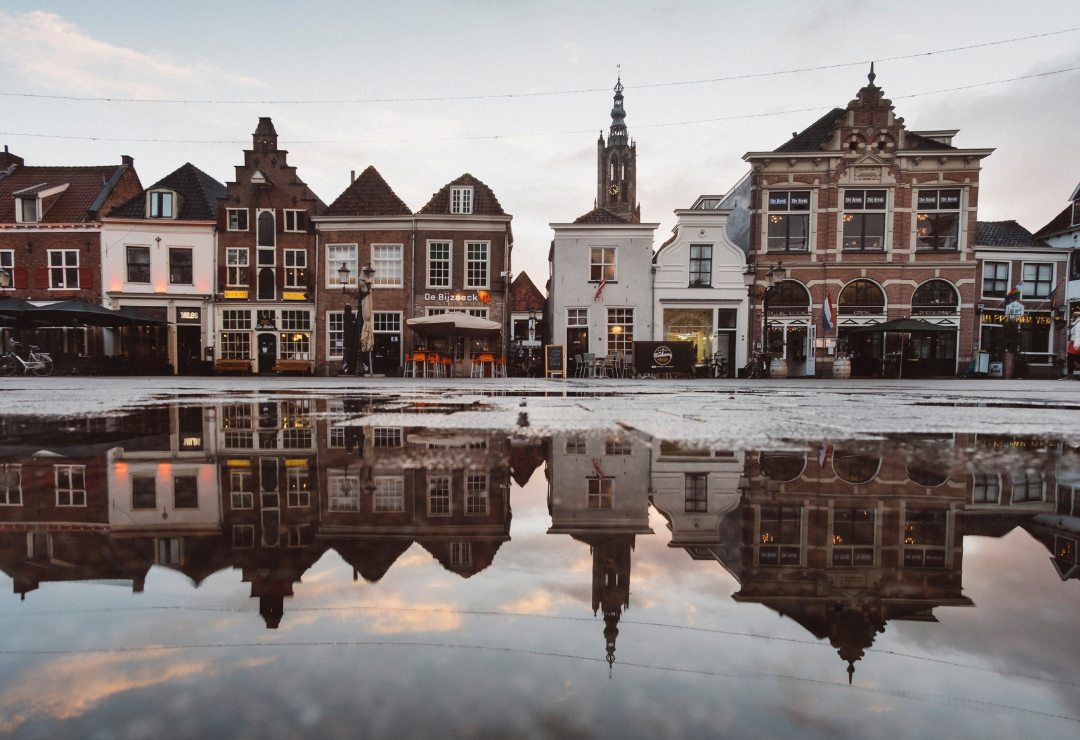Cities in Dialogue
We sat down with outgoing and incoming POLIS Presidents David Dessers, City of Leuven, and Lot van Hooijdonk, City of Utrecht to learn more about their mobility aspirations. From Utrecht's world-renowned cycling policies to Leuven's pioneering shared mobility initiatives, the two Mission Cities reveal all of their sustainable mobility strategies for the future.
An interview with David Dessers and Lot van Hooijdonk, elaborated by Carlotta Inserra.
To listen to the recording of the article below, please accept all cookies.
In a cross-border dialogue, David Dessers (City of Leuven) and Lot van Hooijdonk (City of Utrecht), outgoing and incoming POLIS Presidents, respectively, reveal to us their unique perspectives on sustainable urban mobility. With a shared commitment to becoming climate-neutral cities by 2030, they tell us more about their aspirations, ideas, and practical strategies for fostering more sustainable transport within their cities.
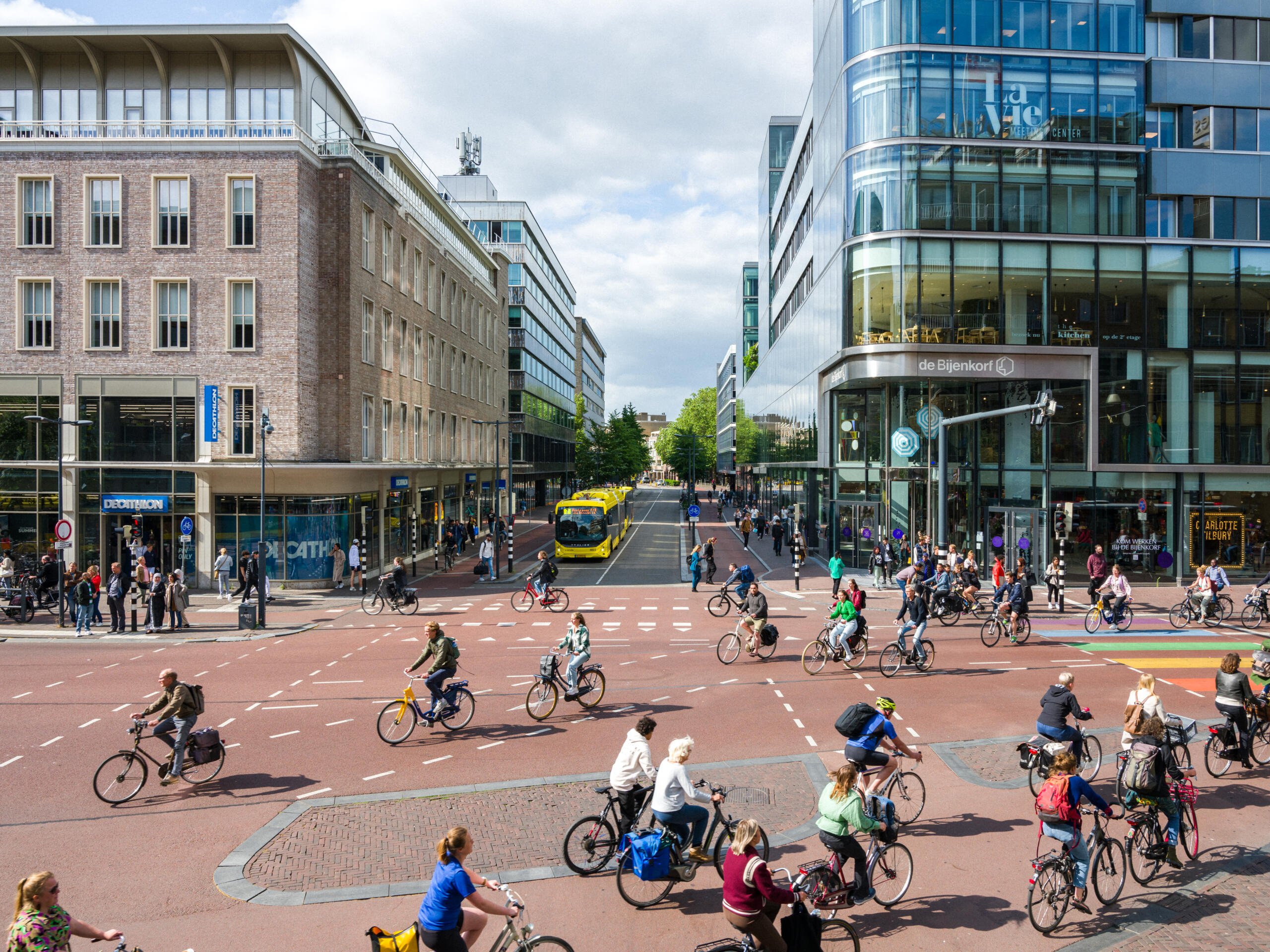
Cyclists in Utrecht. Credit: Tom Philip Janssen
From Utrecht's renowned cycling policies to Leuven's pioneering shared mobility initiatives, this interview unveils the dynamic strategies behind their mobility transformations. They also share insights from their past or future POLIS presidency with some food for thought for the road ahead.
POLIS: You will soon be visiting each other’s cities and exploring their respective transport systems: what are you most curious about? Are there any characteristics you are interested in and would like to implement in your city?
David Dessers (Leuven): As Leuven and Utrecht have a large number of cyclists, we both face the challenge of providing enough adequate bicycle parking facilities.
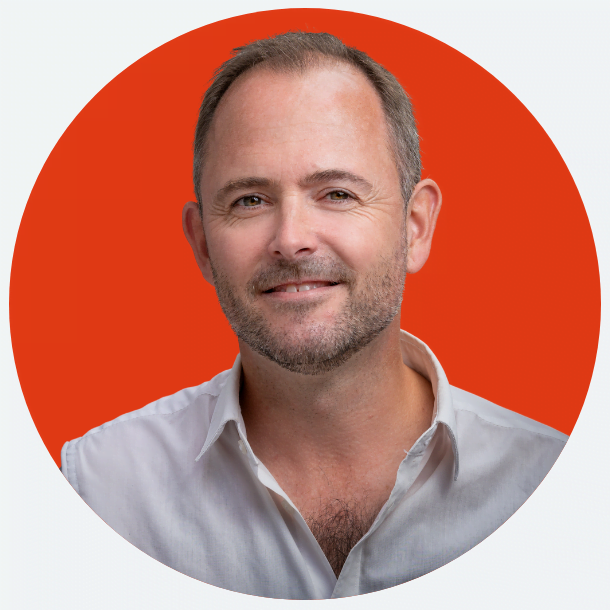
David Dessers, Deputy Mayor for Mobility Climate and Sustainability, Agriculture and Consumption, City of Leuven
Utrecht has made substantial investments in constructing large, secure bicycle sheds throughout its city centre, so I wonder, how does this system operate for users and what incentives encourage residents to utilise these facilities? Furthermore, how does Utrecht garner support from higher authorities with differing visions regarding their plans for investing in the 10-minute city concept? Lastly, Utrecht has outlined a comprehensive vision, a 'barcode', which defines the desired urban landscape. How has this vision been formulated and addressed and how will it be used in shaping the city’s future? These are some of the most interesting measures we have noticed, which we look forward to knowing more about.
Lot van Hooijdonk (Utrecht): We are most curious about the implementation timeline for the new mobility measures: Leuven is much smaller than Utrecht, but has built extraordinary cycling infrastructure you would not expect in a small city. It encompasses interesting actions such as underpasses under roads, bridges over railway yards, and a free-to-use bike garage under its traffic calmed main street. We would also like to find out which obstacles had to be tackled by the administration to implement their measures to transform the city.
POLIS: Utrecht and Leuven are both part of the EU Cities Mission to deliver 100 climate-neutral and smart cities by 2030. How do you aim to meet this ambitious goal, specifically when it comes to decarbonising your mobility systems?
Dessers (Leuven): At the core of mobility lies the concept of modal shift. The mobility initiatives within our Climate City Contract are designed to encourage and expedite this change. One example is our substantial expansion of shared mobility services. By 2023, our goal is to have 30,000 car-sharing users, with an annual growth rate of 20% in the number of shared bicycles.
Infrastructure is another key focus. We aim to accelerate the development of the regional cycle route network, providing safe and comfortable cycling routes. Additionally, we plan to transform the Leuven Ring road into a multimodal hub. Leuven is also committed to the ongoing enhancement of a high-quality public transport network in collaboration with De Lijn.
An essential principle underpinning our mobility projects is the assurance that everyone, including individuals in vulnerable situations, should have access to sustainable transportation options without facing physical, financial, or practical barriers.
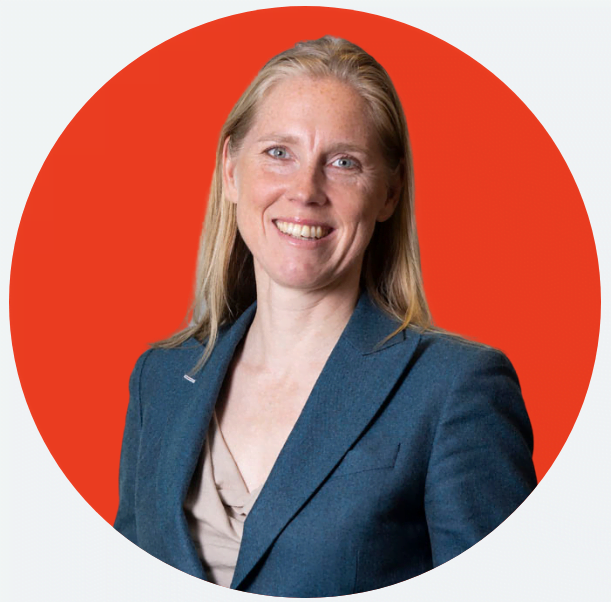
Lot van Hooijdonk, Deputy Mayor for Mobility, City of Utrecht
van Hooijdonk (Utrecht): Our mobility policy is that our streets and city have to be healthy, attractive, and accessible for everyone. That means we aim for (1) more space and priority for walking and cycling; (2) upscaling public transport; (3) no increased car traffic; (4) strict parking policies; and (5) a shift towards shared mobility and mobility as a service.
The result is fewer vehicles circulating and reduced emissions. On top of that, we aim to electrify the cars that do remain. We have low-emission zones focusing on goods transport, and the next step will be to implement this measure for cars in general. At the same time, we are also analysing if more measures are needed to meet our climate goals.
POLIS: When it comes to innovation in mobility, Leuven instantly comes to mind, being named the European Capital of Innovation in 2020 by the European Commission. Indeed, one can refer to the many eHUBS you have implemented throughout the city to foster sustainable multimodal shared mobility for example. What other innovative mobility actions do you have planned?
Dessers (Leuven): The City of Leuven is taking a pioneering role in what is referred to as a ‘data-driven’ policy, which is employed in the preparation of policy decisions, citizen engagement, and the management of various mobility services. Data plays a crucial role: our shared mobility services can expand only if the operators can demonstrate that the current shared mobility modes are used adequately.
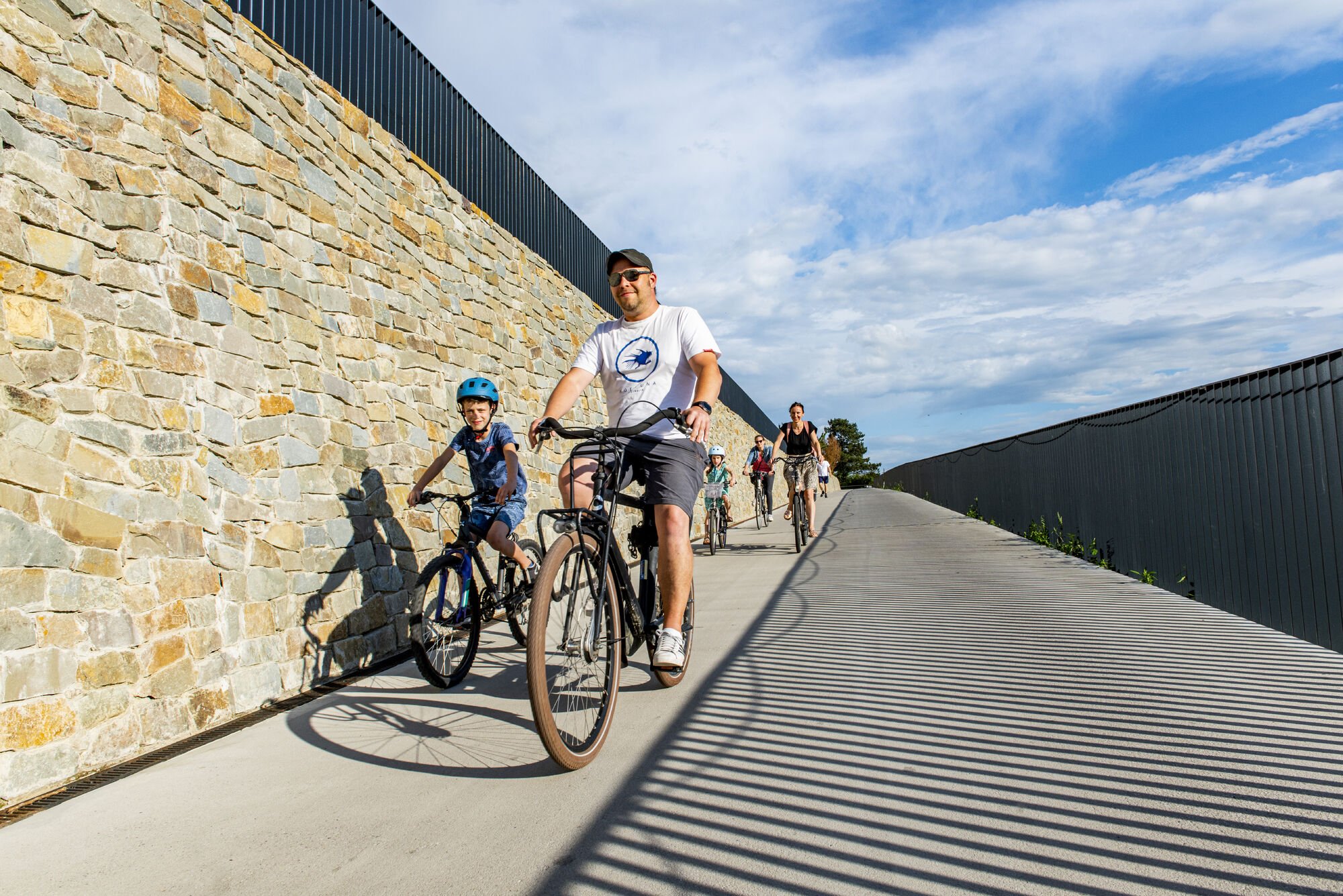
Cyclists in Leuven. Credit: Jan Crab
Through the WeCount citizen science initiative, residents in Leuven can affix a sensor to their windows to collect real-time traffic data, which is made available to everyone as open data. We hope that by involving our citizens in data collection, changes in traffic circulation and other mobility issues become less sensitive. Currently, there are over 150 WeCount sensors throughout Leuven, and the data is utilised in citizen consultations and participation in local mobility plans.
Leuven is also serving as a living lab in the realm of smart city logistics. Key initiatives such as Flex Curb Management, Dynamic Access Control (UVARs), and the We.Deliver platform, which supports local shopkeepers with local e-commerce solutions, are significant step toward optimising the utilisation of our valuable public space.
POLIS: Utrecht stands out for its impressive bicycle use, so much so that it was named the world’s most bicycle-friendly city by the Global Bicycle Cities Index just last year. How have you been building on this impressive achievement? What is next in your sustainable urban mobility priorities?
van Hooijdonk (Utrecht): We are happy with the high use of cycling, but sometimes in the old medieval town implementing policies for it is a challenge, due to the large number of parked bicycles and cyclists. It is a nice challenge to have, of course, but it marks the next level of urban mobility: we will therefore invest more in walking and effective public transport.
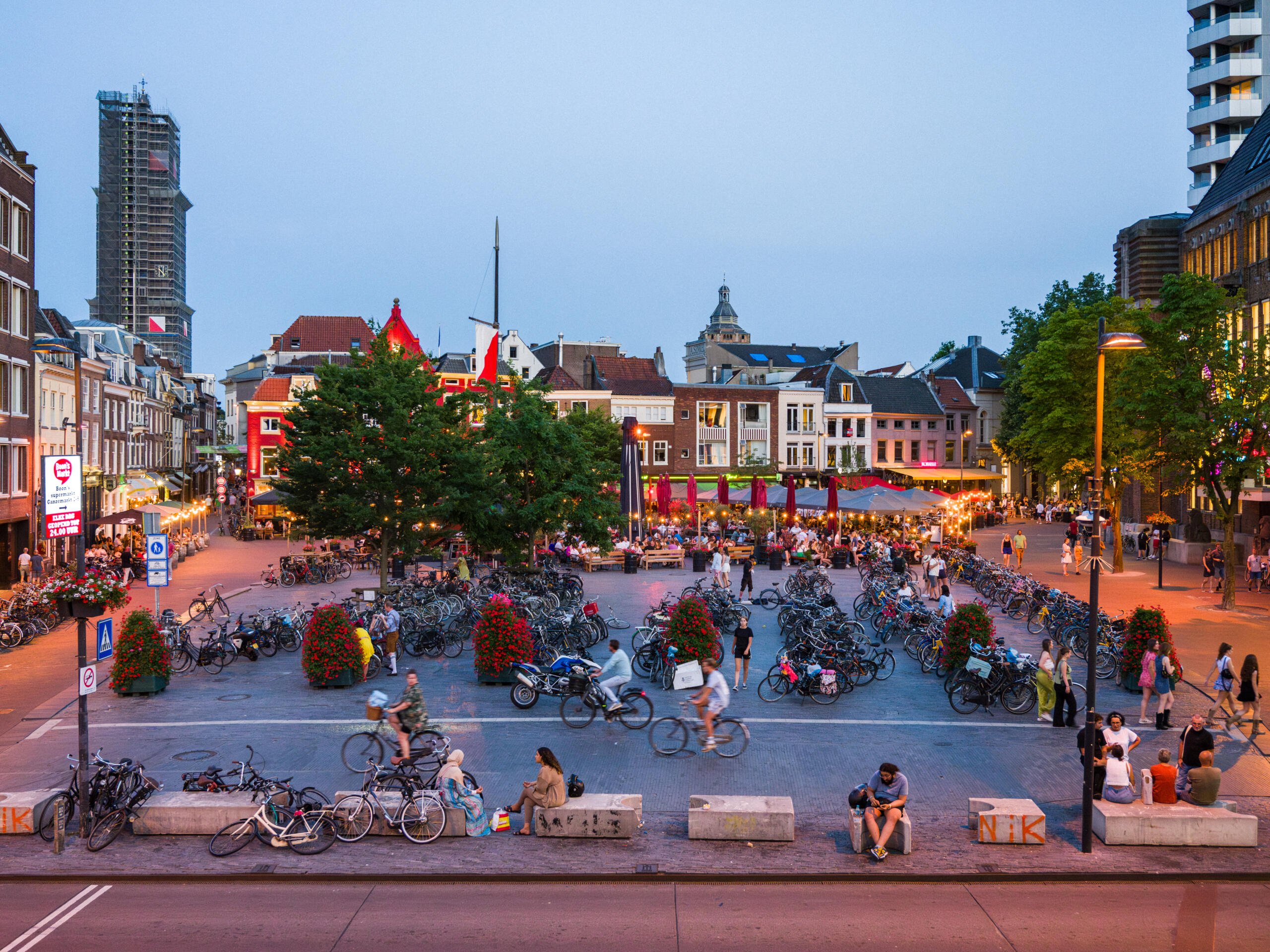
Bicycle parking in Utrecht. Credit: Tom Philip Janssen
In future residential developments, like Merwede and Cartesius, we are planning the space between buildings as a space for people and more greenery. Mobility also has a place here, of course, but we will prioritise walking above all other modes. It is also worth noting that we are building more cycling infrastructure to better distribute the number of cyclists.
POLIS: David, as the outgoing POLIS President, could you tell us a bit more about your overall experience in this position? What have you learned from it, and what advice would you give to your successor, Utrecht?
Dessers (Leuven): Over the past two years, it has been a genuine honour to be a part of the dynamics, ambitions, and inspirations of numerous European cities and regions within the POLIS family. Additionally, the high-level exchange of ideas and positions among the political leaders in the POLIS network has provided significant added value to me.
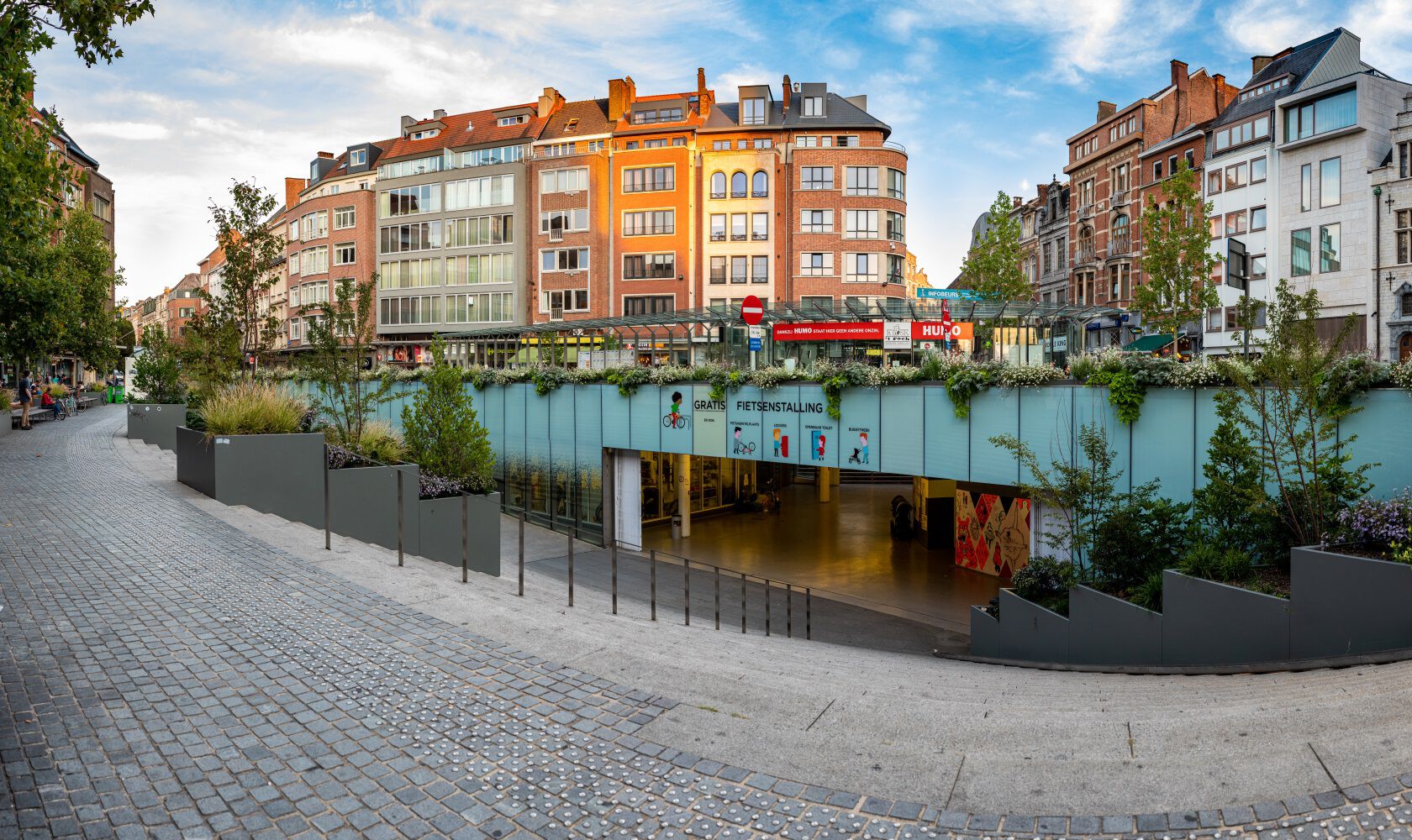
Bicycle parking in Leuven. Credit: KEV&CAM
As Deputy Mayor of a mid-sized city, it was very special to take over the presidency, and for me, it was quite a challenge to work in that international context. As Utrecht assumes the presidency of POLIS, I can only advise them to savour every moment from the very beginning. I am confident that Utrecht is a true frontrunner in various aspects of urban mobility, making it exceptionally well-suited to take on the role of president within the POLIS network.
POLIS: Lot, as the incoming POLIS President, what are some of your expectations and priorities for this role? What would you like to share with the other members, and what do you wish to learn from them?
van Hooijdonk (Utrecht): As POLIS President, we want to develop the recent European Cycling Declaration into effective regulations for more investments in urban spaces for people. Further down the line, we would like to further strengthen the network and the impact we can personally have to become more sustainable in our travel behaviour. What are other members doing to become sustainable? It is only by learning from other cities and regions’ experiences that we can fully understand the challenges and weaknesses of our current transport systems.
POLIS: Thank you for sharing your experiences and ambitions! David, it was a pleasure and honour to have you as our president over the past two years, and Lot, we are very excited to embark on the presidency adventure with you and your city for the coming two years.
Click here to read the article in its original format.
About the contributors:
Interviewee: David Dessers is a Flemish politician from Groen and currently serves as Deputy Mayor of Leuven. Before becoming Deputy Mayor, he was known for his climate activism and engagement in the North-South movement. Dessers was first elected as city councilor in 2012. Since 2019, he has been Leuven’s Deputy Mayor for mobility, climate and sustainability, agriculture, and food.
Interviewee: Lot van Hooijdonk has been an alderman in Utrecht since 2014. Her portfolio includes mobility, energy, and the spatial projects ‘Lunetten-Koningsweg’ and ‘Overvecht.’ During her time as Deputy Mayor for Mobility, she has put Utrecht on the map as a cycling city and accelerated plans for natural gas-free neighbourhoods and sustainable energy generation.
Interviewer: Carlotta Inserra is a Projects and Communications Officer at POLIS. She works on POLIS’ corporate communications and magazine and is involved in sustainable urban mobility projects focusing on inclusive transport and accessible shared mobility services (ELABORATOR, SMALL), greener living spaces in the Mediterranean (Green Living Areas), and sustainable urban logistics (DISCO).
